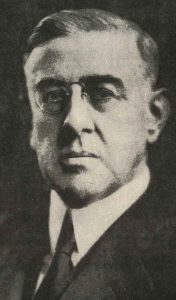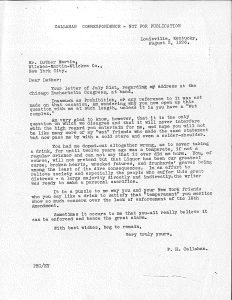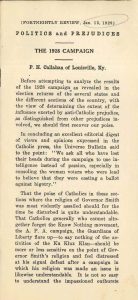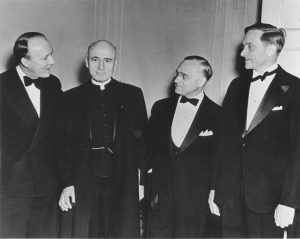Patrick Henry Callahan was a model businessman, political activist, stubborn Prohibitionist, and tireless Catholic apologist of the Progressive and New Deal era. He hobnobbed with the rich and powerful, including celebrated evangelist Billy Sunday (1862-1935), acerbic journalist H. L. Mencken, and populist orator and progressive politician William Jennings Bryan (1860-1925). Nevertheless, Callahan was also a friend of the working class and co-author, along with Msgr. John A. Ryan of Catholic University, of an innovative and successfully implemented profit sharing plan between management and labor in the varnish industry, specifically The Louisville Varnish Company.

Born in October 1866 in Cleveland, Ohio, Callahan was educated in parochial schools and the Spencerian Business College. After a short-lived career as a professional baseball player for the Chicago White Stockings, where he was friends with fellow player Billy Sunday, Callahan became a salesman at the Glidden Varnish Company in Cleveland. In 1891, he married Julia Laure Cahill and they moved to Louisville, Kentucky, where he managed the Louisville Varnish Company, becoming president in 1908. Four years later, Callahan and Ryan produced their 50-50 profit sharing plan between capital and labor for Callahan’s plant, including a living wage for the latter. The plan’s success became widely known and Callahan implemented other pro labor measures such as interest earning saving accounts for employees to purchase homes and autos or use for retirement and medical expenses.[1] Callahan and Ryan continued to be friends even though they clashed over Callahan’s strong support for Prohibition.

Callahan participated in industrial conferences and spoke out against child labor. During the First World War he was an organizer of the National Catholic War Council and chairman of the Knights of Columbus Committee on Religious Prejudice and the Knights Committee on War. Additionally, President Woodrow Wilson offered him a position on the Federal Tariff Commission, though Callahan declined due to his already overburdened schedule. He was also involved with the postwar successor of the National Catholic War Council, the National Catholic Welfare Council/Conference, especially as vice president of the Social Action Department’s Catholic Conference on Industrial Problems, as well as vice president of the National Conference of Catholic Charities (now Catholic Charities USA), chairman of the organizing committee of the Catholic Association for International Peace and an organizer of the National Conference of Christians and Jews.
Callahan also mimeographed and did mass mailing of portions of his personal correspondence, dubbed the ‘Callahan Correspondence,’ to his employees, newspaper editors, friends, and Catholics though out the country. Awarded the honorary title of ‘Colonel’ by Kentucky Governor James B. McCreary, Callahan used his correspondence to comment on national affairs, especially regarding Catholics and prohibitionists. From his association with William Jennings Bryan, his vehement opposition to the Democratic nomination of New York governor Alfred E. Smith for President, and his staunch support of Prohibition, Callahan publicized and was nationally known for his opinions that were often controversial to his fellow Catholics. He summed up his political philosophy as “the country would be much better off if we go down in defeat fighting for a fine principle than the mere winning of an election which of course is rank heresy to some people.”[2]

A supporter of Franklin Delano Roosevelt, Callahan worked to get him elected and was a key liaison between the FDR administration and both Catholics and businessmen. His opposition to firebrand radio priest Father Charles Coughlin, whom he called “virulent”[3] and backing of Ambassador Josephus Daniels (a Methodist) in Mexico brought Callahan criticism from fellow Catholics but gratitude from FDR’s White House. In return, Callahan publicly endorsed many of New Deal programs. Though nominated for national posts in the Public Works Administration and on labor administration panels, Callahan preferred to work locally, serving as a member of the Advisory Committee of the Loan Agency for the Louisville Office of the Reconstruction Finance Corporation and of the National Labor Relations Board for Kentucky.

After two decades of the ‘Callahan Correspondence’ and even more years of public service, ‘The Colonel,’ also known to his workers as ‘The Boss,’ died on February 4, 1940. He was buried in the Archdiocese of Louisville’s Calvary Cemetery. Among his most prestigious awards were his appointment by Pope Pius XI in 1922 as a Knight of the Order of St Gregory the Great and Newman Foundation’s Memorial Award in 1931. His archival papers along with those of his friend Msgr. John A. Ryan, the National Catholic War Council, and the NCWC Social Action Department, are all housed in the Archives of The Catholic University of America in Washington, D. C.
[1] Callahan to R. W. McGrath, undated, CUA-PJC Papers, Box 2, Folder 24.
[2] Callahan to W.W. Durban, October 8, 1927, CUA-PJC Papers, Box 1, Folder 2.
[3] William E. Ellis. Patrick Henry Callahan. Lewiston, Queenston, Lampeter: The Edward Mellen Press, 1989, pp. 12-14.
